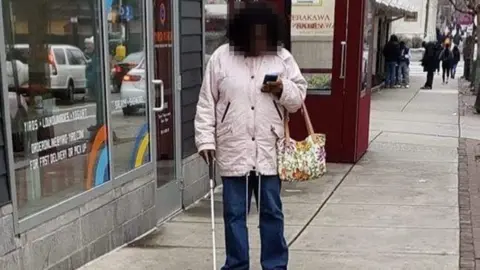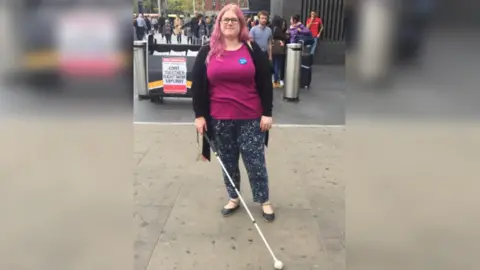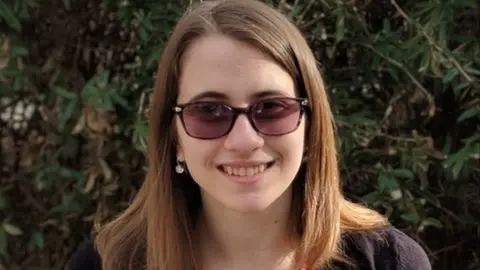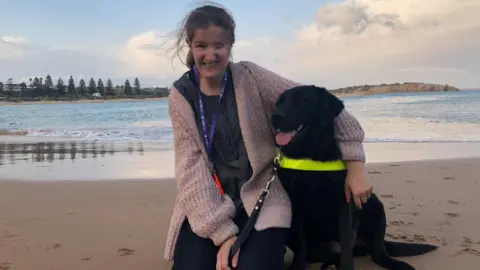'People think you can't be blind and use a phone'
 Wendell Hussey/Facebook
Wendell Hussey/FacebookA photo of a woman using a cane while looking at a mobile phone has been widely shared online with many social media users suggesting the woman is faking her visual impairment.
The image, which the BBC has chosen to blur, was posted on Facebook earlier this month with the caption, "If you can see what's wrong say I see it", and has since been shared more than 33,000 times.
It has led to a number of people explaining that mobiles and other technology can be used by visually impaired people, and, in some cases, can be a lifeline.
Three people with visual impairments have spoken to the BBC about when they have been targeted for using technology.
 Amy Kavanagh
Amy KavanaghDr Amy Kavanagh is a visually impaired activist. The 29-year-old said the Facebook post left her feeling "disappointed and angry".
"I was deeply hurt that a visually impaired person like me had been photographed without their consent and mocked for just going about their business," she said.
Dr Kavanagh explained that "not all blind people are totally blind" and mobile phone technology is extremely accessible.
"My phone is my lifeline. I use a range of accessible functions and apps to magnify and zoom on my phone. I can order taxis with it, use GPS to plan a route and call my partner when I'm lost or stuck."
The London-based activist said she often experienced people tutting and pointing - and has even been accused of faking her blindness while using her phone.
"It's infuriating that people use Siri or Alexa every day but can't understand how a blind person uses their phone."
 Veronica Lewis
Veronica LewisVeronica Lewis, 22, is a student living in Fairfax, Virginia, who has low vision and uses a cane full-time.
Ms Lewis said she thought the Facebook post was a "gross invasion of privacy" but added she would not be surprised if someone had taken a picture of her in a similar manner.
The college student was diagnosed with an eye condition when she was three and her sight deteriorated. She also has a brain condition which causes low vision.

You may also be interested in:

"My phone helps me to adapt," Ms Lewis said.
"I use a smart glasses service which uses the camera on my phone to see through. I also use a volunteer-based app which connects me with a sighted person for help and assistance.
"I'll often use my phone while I'm on the bus to make sure I'm going the right way and people will question how I'm using a cane and looking at my phone."
 Tian Zhao
Tian ZhaoEllen Fraser-Barbour, from Adelaide, Australia, is visually impaired and also hard of hearing.
Ms Barbour said she has experienced people accusing her of faking or exaggerating her disability "for extra privileges".
"I get people making comments like, 'Are you really legally blind if you can read your phone?'" she said.
The PhD student said the use of technology has changed her life.
"Before smart phones I was constantly dislocated and lost as I can't see landmarks, and being deaf, I find it really hard to ask for directions.
"With a smart phone I can track every movement by following myself on my map app. It tells me exactly where I'm going. It's given me such incredible independence."
'Blind people use phones'
The Royal National Institute of Blind People (RNIB) said it often hears of people facing prejudice and discrimination for just going about their daily life.
Director of services at the UK-based charity, David Clarke, said: "The reality is that blind people use phones, read Kindles and watch TV in a variety of different ways.
"These include through the use of any residual vision they might have, synthetic voice, digital Braille technology and audio description amongst others.
"We need to educate social media users and wider society as a whole as to the harm that posts like this can cause - ill-informed stories and ignorant reactions to them can really dent the self-confidence of blind and partially sighted people.
"At RNIB, we urge everyone to see the person, not the sight loss."
